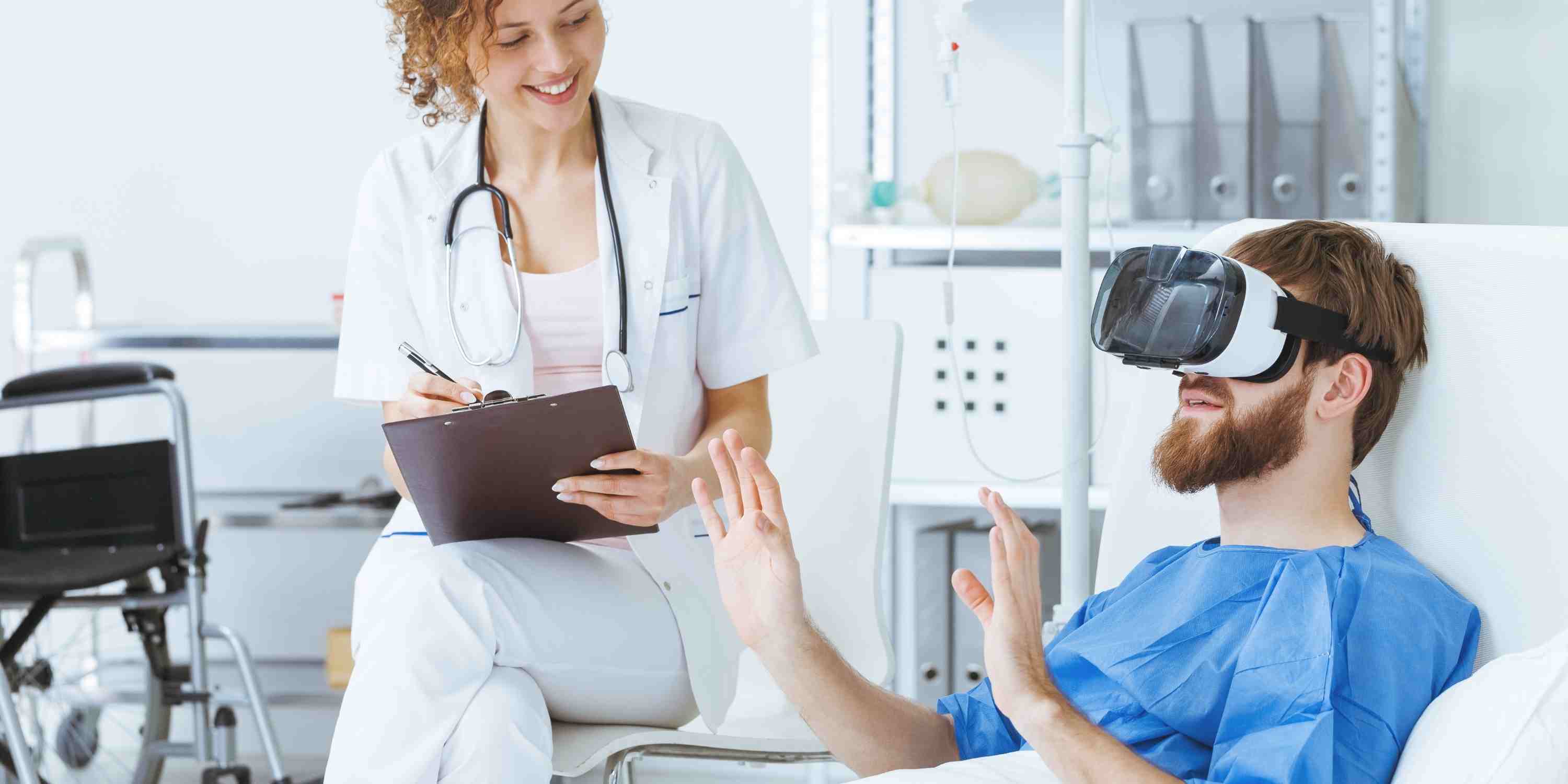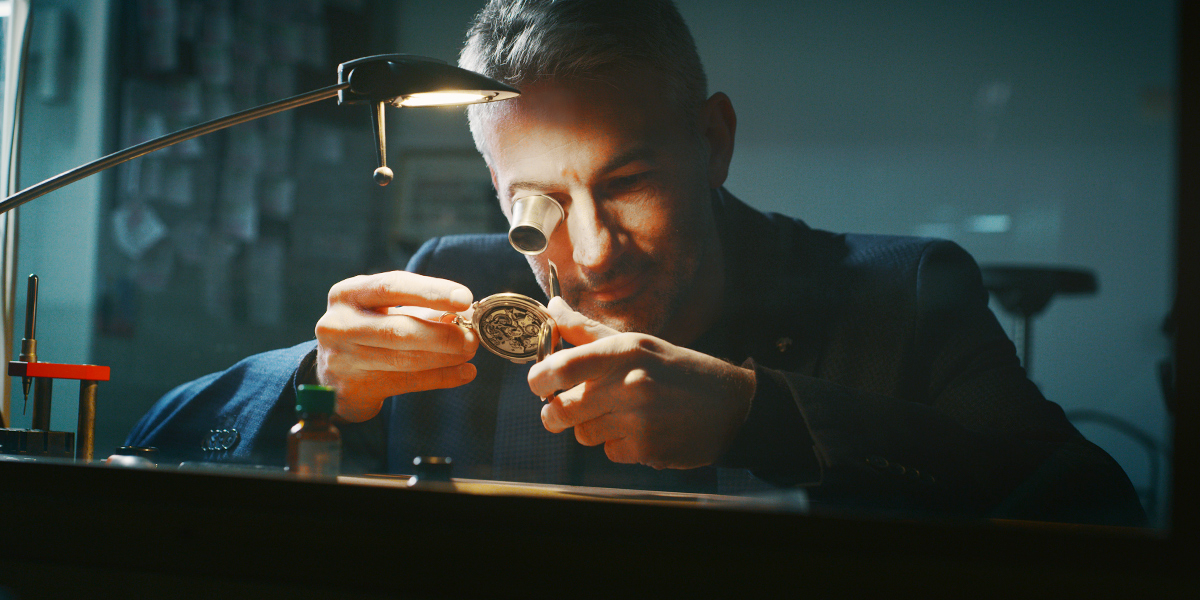Episode 67
Denise Silber, Co-Founder at VRforHealth, talks about the opportunities virtual reality is offering to healthcare practitioners, and how it can help improve the patient experience. In this article, we'll cover the paradox of innovation, the main uses of virtual reality in healthcare, and Denise's suggestion on how to improve the patient experience.
Episode 67
Episode Summary
The paradox of innovation.
Denise Silber talks about the paradox of innovation as she notices that most healthcare organizations that want to implement technological innovations, want to be the pioneers but are not willing to take the risk and deal with the uncertainty of the novelty. Instead, they'd like to observe other institutions adopting the innovation and reflect on their experiences.
She then suggests a way for them to approach innovation adoption in a manner that would benefit all parties involved. And that is to have delegates, people who keep consistent communication with similar healthcare facilities, run questionnaires and analyze the situation to make better-informed decisions with real-time information.
Uses of VR in healthcare.
Virtual reality is still seen as a gaming experience and is not very popular in the healthcare sector. However, there are immense benefits both for patients and healthcare workers that innovations like VR bring to the table. We discussed some in the latest episode:
- Pain reduction
Virtual reality immerses the user. The theory behind it is that if the user's brain is completely focused on what they're seeing and hearing in the headset, then they won't be able to receive the pain signal at the same time and they will start to feel detached from it.
- Working with anxiety
Psychologists can walk through phobias and traumatic scenes with patients, being there with them and helping them visualize all possible outcomes, and manipulating scenarios if needed.
- Visualizing the process
It might become a standard prior to delicate, risky surgery to show the patient exactly what's going to be happening with real images from their body so they can understand how it's going to happen, why it's necessary, and that really the health care team has the whole picture, literally.
Improving patient experience.
The secret to improving patient experience is actually a very simple concept. It is to bring patients to the table, making them aware of the process and giving them a unique perspective of what is going to happen.
This article summarises podcast episode 67 ”How Is VR Transforming Patient Experience?" recorded by CX Insider. For more information, listen to the episode, or contact Denise on her LinkedIn profile.
Written by Alessia Trabucco
Full episode transcript
Denise: The problem that we see regarding the wellness and therapeutic uses of virtual reality is that virtual reality headsets, the metaverse, and Mark Zuckerberg, that all sound like gaming. The average person thinks this is about video games. It's about going out as an avatar dressed as the opposite of what you are, or maybe now using an NFT. And in fact, there has been research going on for some people for 30 years about how to use virtual reality headsets. And as they evolve, the latest ones and the concept of haptics with the data gloves enable patients to have less or maybe no pain, anxiety, and phobias and to be able to use virtual reality for re-education purposes.
Valentina: Hello, everybody, and welcome to another episode of CX Insider. Today Simon and I talked to Denise Silber, eHealth expert, speaker, influencer thought leader, who in 2011 received a legion of honor for her outstanding work. We will talk about virtual reality as the episode title suggest. You will find out what it is, and how it can make physicians more efficient, and you will also hear many examples of this technology changing the industry. There's also bonus content published on our LinkedIn page, so check that out and enjoy the episode. Denise is proof of how your early childhood memories and dreams can guide you on your life path. She was born into a family of doctors, and from an early age, Denise was moved by the dedication of her family members to take care of people in need. This influence inspired her to pursue a career in healthcare after finishing her university degree in the US, then she got involved in the US Foreign Service, moved to Mexico, and studied the rural health care system of the country. Something happened while she was there. Something that you will hear later on convinced her to go back to the U.S. and complete her MBA at Harvard. She started working at Merck Pharmaceuticals, gained experience, and witnessed the reality of patients receiving poor communication and physicians not continuing in their education. That became the turning point.
Denise: The next milestone was discovering PubMed, that fantastic medical base of publications, of millions of publications, and I thought then this could be such a game-changer for all patients to be able to access at least the abstracts, if not the whole article, and be able to find out what the latest research is in their field. Of course, not all patients, but those who would be able to and would want to. And at the time I had left the pharmaceutical industry and had created my own medical communications agency and decided that's all I want to devote myself to what we called at the time, the medical, internet or health care on the Internet. And this was in France where I'd gone with Merck. I went back to the US, where I became involved in a second medical opinion start-up that had been created by somebody from my class, and saw there yet again how there were such differing opinions facing one in one case and how many mistakes there were in diagnoses, whether under- or over-diagnosing cancer, which was their main area. A couple of start-ups later because at the time I'm talking in the late nineties, early 2000, it was very hard to get funding. I decided that I would rather just run my own consulting company, not look to fundraising and all the issues that brought. And this company, Basil Strategies, is the one that I've been running for 20 years now.
Denise: One of the highlights of it was when we created an event, a conference that met annually with hundreds of people in Paris. Paris was not at that time that interested in eHealth in general, and we really augmented the awareness of e-health or digital health at the time by holding this annual doctor's 2.0. And a conference with leaders from around the world speaking very practically about what they were doing, their start-ups, their innovations, whether at the hospital or at the start-up level, and also enabling patients to do keynotes. And as well, we popularized social media using Twitter during a conference, and analysts came and explained how you could use this in a practical way. So we were really at the Avant-guard with that. That was from 2010 to 2017. During the same period, I was running a club for pharmaceuticals, doing breakfasts about e-health and digital, and how that could help them. And then also through a conference, by being active, being on stage twice at the Cedars Sinai Virtual Medicine Conference in 2018 and 19, I was approached by a woman, a cancer survivor named Beth Delhi, who lives in Dallas. And she said, I heard you say that you want patients to benefit from virtual reality, let's do something together. And so we've been working on that for three years and we've made quite some advances. We're happy with that.
Valentina: Research on VR has been going on for a while, but the majority of the population doesn't associate VR with the medical treatments for which scientists definitely deserve more credit than they receive from the public. So let's unwrap that.
Denise: The problem that we see regarding the wellness and therapeutic uses of virtual reality is that virtual reality headsets and the metaverse and Mark Zuckerberg, that all sounds like gaming. The average person thinks this is about video games. It's about going out as an avatar dressed as the opposite of what you are, or maybe you now using an NFT. And in fact, there has been research going on for some people for 30 years about how to use virtual reality headsets. And as they evolve, the latest ones and the concept of haptics with the data gloves to enable patients to have less or maybe no pain, anxiety, and phobias, and to be able to use virtual reality for educational purposes in a much more satisfying way.
Valentina: Imagine the possibility of minimizing pain without the use of drugs. What exactly is happening while wearing a VR headset?
Denise: Virtual reality immerses the user. The theory behind it is that if the user's brain is completely focused on what they're seeing and hearing in the headset, then they won't be able to receive the pain signal at the same time. And sometimes pain becomes self-propelling because you have this pain, then you look for it. And by cutting that for a few minutes, for 20 minutes or a half-hour, the person feels much better, feels detached from it. For anxiety, what virtual reality can do. Now, of course, anxiety and pain are connected, but let's say for a pure phobia, usually prior to virtual reality, the psychologist would have to use words to describe and help the patient. Imagine that they're in the scene that bothers them and then work with them, and talk them through it. With virtual reality, there are scenarios that the psychologist or psychiatrist can manipulate. Let's take somebody who is afraid of flying. The healthcare professional can take them from a situation where they're just getting into the taxi to go to the airport to actually all the way through with all sorts of variations to their in the plane. And there and there is turbulence. And so psychologists that I had interviewed told me that this reduces five or sixfold the number of sessions required to enable that person to drive again to whatever the phobia is. Many companies are working on this. There's lots of proof for the re-education. It is similar. The person's eyes will be captured, their gaze will be captured, and they will see what it is that they could be reproducing or doing. Like maybe their eyes would strike out at stars in front of them, and of course, the equipment would be counting it so that instead of that boring thing where I have to do three times 50 whatever, it's all done automatically and it can take you to the next level. It can help people who have phantom limb issues. Imagine that they're really walking properly, looking down as they walk, let's say, with guardrails. It can help people with balance issues. So, so just so many things, and this isn't known. And so we built the website such that people can search for demonstrative videos that we have curated on these different topics. And then we use the blog to present current events and current news. And the latest thing is those decision-makers, let's say, at hospitals or in private practice, might not know where to find solutions that are of quality because the regulatory aspect is still being put in place. And we give the companies that list with us the opportunity to explain all of their scientific evidence and patents and certifications, and then the decision-maker can see that and compare. We hope that there will be a virtual comparison made amongst the companies. They'll see what the other companies are doing and present more and more quality information.
Valentina: In 2019, researchers at UCLA found medical students who received VR training managed to repair a bone fracture 20% faster than students who received traditional training. And there are plenty of other studies showing how VR training is highly efficient. However, the use of VR in health care facilities is still not as widespread as one would imagine.
Denise: Why is it not known? Because we live in a world where people don't know where to bring their attention. We are bombarded with information about everything all the time and it takes a while to change the curriculum in medical schools. As I mentioned as well, the regulatory and reimbursement aspects are still being worked out. Interestingly, the US and Europe are really at the same level and for this particular virtual reality, France is quite advanced in terms of the number of hospitals providing it in the number of psychologists that are using it. And not all of the US is. There are centers where it is. It's just a question of time. This is true for any medical innovation. And this one, there are certain challenges, which is that the equipment is being updated as we speak. Every year. There are new kinds of headsets that the headsets are often locked with one application. And so the hospital might not know, well, which one do we want to take it from? Let me stay with that one. Or do we have a closet full of headsets? The reimbursement situation in the US is primarily around the action itself. Is there proper encouragement or stimulus for the doctor to use this from a financial standpoint? It may not yet be clear, but I think a lot of it has to do with getting this into continuing medical education as well.
Simon: And how with that in mind, you know, if hospitals do adopt, there has to be a focus effectively on the customer experience, doesn't there, or on the patient experience. I guess that's probably the best focus here for this is what would you see as being the. And it's kind of an obvious question, really, but what's the most obvious improvement to that patient and customer experience with these technologies?
Denise: I would even think that if this is a health care establishment, a hospital, or a clinic using VR for procedures, I mentioned the needles or biopsies that denote that they really care about the experience that the patient is having because as you were saying earlier, it's not just to hop on a skip to include the purchases and to to to train the people and then to maintain it, to update the software. So if they're doing this because they see a benefit in the patient experience, there's a term that's becoming more commonly called digital sedation using virtual reality. So I think that that's going to propel it forward. I also believe that physical therapists and physical therapists and the related professions around them, rheumatologists, I guess orthopedic surgeons are going to find it commonplace to suggest follow-up with this. I think it might become a standard prior to delicate, risky surgery to show the patient exactly what's going to be happening with real images from their body so they can understand how it's going to happen, why it's necessary, and that really the health care team has the whole picture, literally. They're not just going in there to see what they find.
Valentina: Even with sufficient evidence of the efficacy of this technology, it may be difficult to start using it in hospitals. It radically transforms the way patients are treated, and you also need to train the staff. It's quite complex innovation. So we ask Denise what she would advise health care companies to do if they choose to implement this technology comparison.
Denise: Testimonials. I would delegate someone to gather information from other hospitals, prepare a questionnaire and find out how it is going because there are always unseen issues whenever you install any innovation. Quite often, as you would know, health care establishments sort of have their eye on certain others, and once they see that they do it, then they start considering it. But whatever the innovation and change you want, you want to look at the research and then you want to speak to the people that are running it to. Sometimes that's one of the paradoxes of innovation, is that a lot of times you want to be a pioneer, you want to be the first one, but you also want to know what the other's experiences are. And you can't have both.
Valentina: So which hospital departments should adopt this technology first?
Denise: Well, as I, I think that there's a quick win with the birthing or Labour Department. It seems to me that you have everything favorable there because it's a younger population. If some of the professionals think I'm not going to try this on an older person, that isn't true that that idea. But you have the younger population, the women are in need. Many do not want to have the local anesthesia. There are reasons not to, and there's no worry about having to provide this chronically. They're in there for less than a day. You use this in the final few hours and done and it's on to the next person. So you have ample time to do the disinfection of it. I think that that is really a quick win and I'm surprised that it isn't happening more. I would like to add, before mentioning the VR and going on to AI, that health care establishments in the UK are innovating, they're innovating with apps. And I take my hat off to ORCA, the organization that has put together a platform with experts and software that can categorize, study and categorize mobile applications, evaluate them, and then makes them available to the providers through Awka libraries that are on the topic could be diabetes, rheumatoid arthritis, whatever it is makes available the better or the best ones. So I wouldn't want people to take from this episode that there's not enough innovation going on in the UK. I also think there are a lot of good studies going on about what the because there's a lot of digitized medical records, what you can get out of that. But if to what you said about VR, I would say it's that. And then the fear of needles in particular pediatric and then the digital sedation for certain procedures, painful procedures, all of those are their short-term uses. The next part, which is for chronic pain, it's very individual. It does improve things, but it's maybe not going to eradicate the pain. So it might be less easy to see that you've completely solved the problem. That being said, it's going to avoid or reduce the use of very strong analgesics.
Valentina: Denise has a multicultural background and has gained work experience in countries all around the world. Simon and I were curious about the observations she gathered throughout the years regarding how different cultures and countries approach patient experience.
Denise: The health care field cannot be independent of the entire culture and living experience on a day-to-day basis of any country. So, for example, certain people might consider that the US invented the term customer experience and the whole idea. Over the latest last few decades of really paying attention to focus groups through surveys of the needs of the client in order to improve the bottom line, they realized that there was therefore, you're more likely it is true in an American medical setting to be asked a lot about your experience. That doesn't mean that overall the experience is better because just might think when you see the price and hit the floor. It is unfortunate, I would say that there is something common everywhere around the world that we expect less from the government than from the private sector in terms of the customer experience. People, I hope I'm not making really excessive generalization, but if you go into a public office, whether it's medical or educational or police, you're less surprised if it's a little bit dowdy than when you go to a private one.
Denise: And this is true in any country. And then the percentage of public to private varies. I've been to places in Africa where there is nothing but the public dispensary and it is tragically ill-equipped. So even if they're nice to the patient, they can't give them a great experience. But I guess that thanks to the power of the cell phone and the power of social media, those who manage and govern whatever it is, are more at risk of being called out on these less than acceptable experiences. So we can hope that that will bring the customer experience forward. What would I recommend after so many years of presenting and creating events around patients and professionals that you bring the patient to the table in advance of whatever it is that you're conceiving, so that with their eyes and their perspective and as well, the health care professionals are not going to invent anything without involving them and their workflow? And you will have a better product or service, to begin with at lunchtime than if you wait until afterward to get their insight.
Valentina: By the end of the recording, I asked Denise if there's anything else she would like to share with our listeners. If I should pick only one takeaway from this episode, it would be the following message.
Denise: I have devoted 20, 25 years to studying eHealth and patient engagement and encouraging people in the direction of these new ways of doing things. But I am not at all somebody who feels that automatically innovation is better than not innovation. I think that the main basis of quality medicine is humility on the part of the practitioner to not suppose that because this looks like something that he or she has already seen, that it is that there may be other factors. Humility in how to draw out from the patient, the ability to communicate. I mean, this has been said by the pioneers of medical studies over the centuries that listen to the patient and you will find out what you need to do. And then that sort of isn't always heard. And I think I think it's important for me to express the fact that I am very interested in the human relations side of this. I also feel that one should not be deprived of all the benefits of technology, but you need to find a way to bring the two together. And never forget how important it is to listen to and encourage and support the patient.
Valentina: Before we say goodbye and finish this episode with Rapid Fire questions, I wanted to say that there is a bonus content with Denise that is not part of today's episode and it is published on our LinkedIn. You can find a LinkedIn page on our link tree provided in the episode description below or simply type C insider podcast in the search box and it will pop up. Enjoy the rest of the episode and I will see you in two weeks. Okay, my first question. New York or Paris?
Denise: Both. Good.
Valentina: What's your favorite book you'd recommend everyone to read?
Denise: So if it's about VR, there are two books, one by Brennan Spiegel called VRx or Virtual Prescription. That is a very sort of literary approach to what virtual reality brings. He writes extremely well. And then the other book is a book that was edited by Bob Fine and Walter Greenleaf about virtual reality in health care. The first one came out in 20 2021 and the other one in 2022. And it is a compendium that is like a real academic reference book from A to Z about virtual reality. They both can be read by professionals or consumers, but are probably more useful to professionals.
Valentina: Mm-hmm. What was the most impactful advice you were ever given?
Denise: This is a crazy story. But when I was in Mexico City living and working for the American embassy, at one point I was asked to visit on a daily basis American prisoners who had been drug traffickers. It so happens that I knew at the time I was very young. She was a fairly old surrealist painter who has since become famous, named Leonora Carrington. And one day I saw her and said, you know, this is such a mismatch. Asking me in my early twenties to go visit these hardened prisoners. I'm going to have to leave the Foreign Service. But I don't know what to do. And this Woman was surreal in her everyday way of living. She didn't follow any particular rules. There was nothing predictable about her. She smoked with a long cigarette holder and had a British accent, she said. Business school, my dear. And that led me to apply to Harvard Business School and totally change the course of my life.
Valentina: That was the turning point.
Denise: It was a professional turning point. Other than that, I picked up so many things from friends and family all over the place. My grandfather said, Go where they want you. And that has been an excellent thing because I feel that my life has been a series of doors open and I quickly say yes because I guess I've made that particular door open. And rather than going on and trying to make three doors open and then it's confusing as to what you do. So yeah, I had only sent out one application, the Harvard one, I was ready to do Stanford. I got into Harvard, said, no more work. I'm going to Harvard.
Valentina: That's great. Okay. My last question, which you kind of answered during the episode, but other than VR, what's the health care innovation that recently sparked your interest?
Denise: Hmm. I don't know. It's not recent, recent, but alive core. I love the original story of Alive Core, which was the first accessory that you could use with an iPhone to do electrocardiograms at a distance. So this was invented by there's a general practitioner living in Oklahoma. And I find that interesting too because it's not as though he's in the Silicon Valley or Boston areas where surrounded by technology. He does have a history of creating patents, but he did something that was not going to go over easily with colleagues. The idea of having such an accessory for something so delicate as doing an electrocardiogram, and it's turned out to be a big success medically and business-wise. So that one came to mind.






